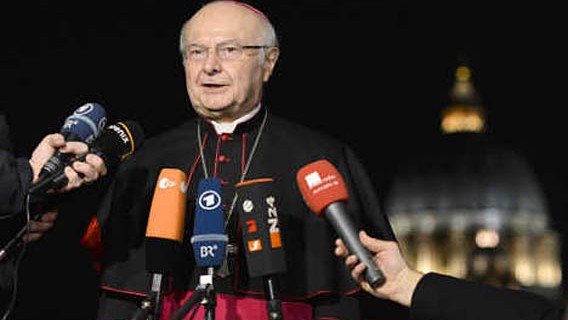Gay porn actor left it all for Jesus after ‘possession,’ terrifying near-death experience
Note: An extensive interview with Joseph Sciambra is included below the story.
NAPA, California, October 2, 2013 (LifeSiteNews.com) – Joseph Sciambra, 44, will be the first to tell you of his large-hearted and abiding love for gays. He will also be the first to tell you that despite its feel-good name, genuine happiness cannot be found in the “gay” lifestyle.
The former gay porn actor has described his own journey into the darkest core of the gay underworld in the Castro District of San Francisco in the early 90’s as like being “Swallowed by Satan” – the title of his new book, in which he recounts his experiences.
Joseph, who left the gay scene thirteen years ago after a dramatic reconversion to the Catholic faith, says his quest for love and acceptance through sex began with pornography. At the age of eight, he one day naively flipped through a porn magazine left out by an older brother. This was followed by more graphic porn magazines. Then came masturbation and the urge to act out with others what he saw in the magazines.
Joseph says that what he craved to experience was a deep and satisfying sexual nirvana. He grasped for this by expanding his sexual escapades. New sexual experiences with new partners was the only stimuli that seemed to offer him the excitement, what he called the “happy-place,” that he was so desperately seeking. Brothels and prostitutes became part of his sexual routine.
Becoming bored with female porn, Joseph moved onto gay porn. Then he realized that he must be with gay men if he was to gratify his ever-increasing sexual desires.
Older gay men initiated 19-year-old Joseph through gay sex into the Castro gay scene. He began visiting bathhouses and adult video arcades for anonymous gay sex. In his quest for love and companionship Joseph immersed himself deeper into the gay scene. What he sought after so desperately constantly eluded him.
So-called “glory-hole booths” (a place for anonymous oral sex) offered the next form of excitement. It was at one such place that Joseph says he delivered himself sexually over to Satan, who presented himself in the form of a gaping mouth with a foot-long forked tongue. From that point forward Joseph began hearing voices inside his head.
Seeking new stimulant, Joseph became an amateur porn actor and escort.
Joseph finally found himself traveling down into the darkened dungeons of sadomasochism. Here he inflicted and received sexualized pain and torture. This included horrendous practices too graphic to describe here. Most of this was filmed for the gay porn industry. Sexual nirvana for Joseph could now only be obtained along with violence, subjugation, and aggression.
Now in his late twenties, Joseph says that all he experienced inside himself was hate: hate for other men, hate for his life, and hate for the world. By now he had experienced sex with as many as 1000 men. He embraced everything that was sexually gruesome and hideous.
One diabolical orgy was so violent that it put Joseph into the hospital. There he had an experience of death and of his soul descending into an open and salivating mouth, which he says he knew was hell.
But Joseph’s Catholic mother was at his bedside, praying earnestly. Fear seized Joseph’s heart. He did not want to enter the eternal mouth that had opened up to receive him because of his life of choosing sin. He says he begged for God’s help and deliverance. At that moment he felt himself being brought back into his body.
Joseph went on to rediscover his Catholic faith that he had forsaken in his childhood. He experienced forgiveness from God for his years of sexual sin in the sacrament of confession. Demons were cast from him in an exorcism performed by a Catholic priest. He says he found strength to continue his faith journey by frequently receiving the Eucharist at Mass, and found help and consolation from Mary, the mother of God.
Joseph admits that he still struggles with attraction to other men and with temptations to masturbate, but he says he has come to know that the love, acceptance, and peace he so ardently sought in sex with other men, Jesus now gives to him in abundance through a spiritual life.
For Joseph, same-sex attraction is a cross that God has asked certain people to bear for the redemption of the world. Now running a Catholic religious shop in Napa, California, Joseph says that there is genuine joy in carrying the cross. By uniting his sufferings with those of the suffering Jesus, Joseph believes he is helping to save his gay friends from a devilish fate he barely escaped.
According to Joseph, many gay men have come to him, telling him of their unhappiness and their own similar experiences in the gay lifestyle. Joseph says he will speak first of his love for them. Then he will speak of how his encounter with and acceptance of God’s love saved him from being “swallowed by Satan.” He will tell them that gay sexual ecstasy is momentary and delusional, but God’s love is enduring, satisfying, and as real as it gets.
Joseph shared with LifeSiteNews.com (LSN) his experience in the gay lifestyle as it relates to today’s hot-button topics on homosexuality.
LSN: In your book “Swallowed by Satan,” Playboy was your gateway to hell; pornography led you to homosexuality. What are your thoughts on the logic behind this progression?
Joseph Sciambra: Children, especially boys, are naturally curious about the opposite sex and sex in general. Before I even saw a pornographic magazine, I had already been introduced to the idea of female sexuality through such popular shows of the time, including “Charlie’s Angels” and “Three’s Company.” When I had the opportunity to see naked women in a Playboy or Penthouse, of course, I took it. After all, many of my friends’ fathers collected Playboys, as did my older brother; so it was seen as a sort of male passage rite; looking at porn somehow made you a man.
After that first introduction to porn, you are hooked. Then begins a desire for more pornography and variant forms of porn; i.e. different female models, more explicit material, then the inability to become excited by soft-core forms of porn. It’s a cycle of addiction that often mirrors drug and alcohol abuse. When this exposure to porn happens in childhood, the entire structure of desire within the mind becomes reliant on a constant flow of visual stimulus. Later on, in adulthood, the idea of being with just one woman often leaves the porn addict feeling underwhelmed.
LSN: Your experience with homosexuality is absolutely terrifying, especially when you relate the kind of sexual acts that were forced upon you and that you forced upon others. What you related of your experience seems quite alien from anything having to do with the political push for gay “marriage”. From your experience on the gay scene for ten years in the 90’s, what do you think is really behind the push for gay “marriage”?
Sciambra: At its core, I believe the push for gay marriage is a political ruse foisted upon the gay community by the Democrats and some within the elite liberal gay-lobby movement. Back in the early 1990s, when I was an out and proud gay man, I saw this same thing happen with DADT [Don’t Ask, Don’t Tell policy] in the military. It became a political rallying-cry in which the gay community could lock-step behind; even though this policy affected relatively very few gay men or women.
Now, the concept of gay marriage has been successfully fused with that of homosexual equality. This creates a dynamic in which all gays feel obliged to support gay marriage — even if they have no interest in marriage for themselves — because it has to do with homosexual liberation. And, the point of homosexual liberation is to inevitably create some kind of relief within the gay mind, because every gay person, once they have embraced their homosexuality, comes to that end [of having no peace] after much suffering, persecution, and struggle. Going into the lifestyle is an attempt at peace and wholeness. But, it’s a deception. And the peace they long for never happens.
LSN: Based on what you relate in your book about homosexual relationships, it seems that mainstream media has presented America with a sanitized version of the gay lifestyle, as can be seen in a movie like "Brokeback Mountain" which glorifies a homosexual relationship between two cowboys. What would you say to awaken people to the reality of what homosexuality is really about? How would you pull the wool away from people’s eyes?
Sciambra: Because the mainstream media is collaborating with those in the gay elite, there has been a very skewed and untrue picture of the homosexual lifestyle painted for the American people. At one time, I bought into that as well, although the imagery was very different when I was a child. At that time, The Village People and The Castro in San Francisco were portrayed as one big party.
By the time I entered the lifestyle, the mood had changed with the advent of AIDS. I had to watch as beautiful young men from all across the United States, who arrived in San Francisco seeking a safe harbor of acceptance, succumbed to disease. It was heartbreaking. But in the 90’s, things started to return to business as usual: gay pornography became a hot commodity and a new generation of boys were lured to their deaths by promises of pleasure with no risk.
With my book, my intention was not to simply disgust people or gross them out, but to reveal a very significant side of the gay lifestyle that is rarely investigated. The last serious exploration was probably the much maligned film “Cruising” directed by William Friedkin. But that movie got it right. Because, although, gay men may one day settle down and attempt monogamy, the vast majority, beforehand, had to travel through a wasteland of perversity and promiscuity. Because, every young boy, who just enters the lifestyle, is quickly set upon by a troop of eager older men ready to exploit new recruits. It sets you up for a life of bitterness and disappointment. Some survive and move on, many do not. But, they all reemerge damaged and untrusting.
You are very keen and astute to realize that the gay lifestyle has been “sanitized” by the media, and that was precisely what I wanted to fight against [by writing my book]; to show just how ugly, and yes dirty, the gay lifestyle is; but also how ultimately sad and tragic it seems to end for almost everyone involved. I especially wanted to reach modern parents who are so willing to offer their sons up to this horror – to explain what awaits their children, and to also give some dignity to those who fell into the life because of no fault of their own.
LSN: Good Christians speaking out against homosexuality are accused of bigotry and homophobia. Such Christians will respond that they are not speaking against persons who identify themselves as gay per se, but against their actions which are harmful to everyone involved. Many Christians are simply motivated by love of neighbour to speak this way. (But of course, unfortunately, some are not.) As someone who has descended to the very depths of the homosexual lifestyle, what message do you think Christians should give to homosexuals that would help them the most? How should Christians deliver the message so that it’s effective and so that they avoid coming across as bigots?
Sciambra: I have seen many unhappy and searching gay men and women turned off to Christianity because of an over-zealous Christian who showed them condemnation, but no love. As I discovered, when a gay person is contemplating leaving the lifestyle, they often just want a disinterested friend; i.e. someone that doesn’t want or demand something from them. This may be a matter of just listening, not really offering a lot of catechesis or dogma, but simply letting them know that you care. Once a relationship is established, you have to decide when and how the Truth of Jesus Christ’s plan for each one of us is to be delivered. Again, one must always remember that these are deeply wounded and suffering people: they need your sympathy, compassion, and prayers.
LSN: You encountered the darkness of spiritual evil during your sexual downward spiral. Is there any connection between the homosexual movement and the spiritual forces of evil?
Sciambra: I believe there is a connection between the homosexual movement and the forces of evil because the gay lifestyle is essentially a lie and a tool of deception. Those that advocate for it – promise much, but rarely deliver.
Now, one of the main recruiting devices is porn. It gives a completely false view of gay relationships and gay sex. In porn, everyone is beautiful, happy and healthy. Its themes, often emphasizing supreme masculinity and sexualized father-son relationships aims at the very woundedness that sits at the center of every gay man’s malformed sense of masculinity. Porn preys upon their desires for healing. What you get, is a quick fix. That, later on, leaves you more damaged than before.
I know heaven wept when I had to see so many young men buried because of disease and suicide. It was a waste. And, that was evil.
LSN: There is a movement to crush those who offer therapy to persons struggling with unwanted same-sex attraction. What are your thoughts as to why there is such opposition to this kind of therapy?
Sciambra: There is opposition to gay-reparative therapy because [born-this-way gay advocates] know deep-down that it works. Very good reparative therapy excavates the root causes which brought forth homosexual desires in the person. For the most part, these incidents are embedded in early-childhood traumas. When a therapist is able to dig down and reveal these traumas, they no longer have the same power over the person that they once did. At that point, relationships can be mended and new healthy friendships can be fostered.
LSN: Porn led you down a slippery slope. What advice do you have to offer to someone struggling with pornography addiction?
Sciambra: The advice I would give to someone struggling with pornography is that healing is possible, but that it takes time, perseverance, and being stout of heart. Most importantly, this is only possible by the Grace of God and our full cooperation in His Love for us.
The person must spend much time in prayer, taking part in the Sacraments (daily Mass and weekly Confession) in order to understand why they have this need to view pornography. What empty space is it filling? A great part of this endeavor is having a very good confessor and or spiritual director. And, in this I discourage men from roaming about from confessor to confessor because they are embarrassed that they have become a habitual sinner. When you find a qualified spiritual director, stay with him. You have to start from this place of honesty: with yourself, others, and with God.
LSN: Anyone would recoil at the thought of seeing someone go through what you experienced of homosexuality as described in your book. What advice do you have to someone struggling with — and tempted to act out on — same-sex attraction?
Sciambra: To those struggling with same-sex attraction, I would encourage developing their prayer life; their relationship with God. They need to spend much time in prayer, going to daily Mass, and making a weekly Confession.
They also need to have a very good confessor and/or spiritual director.
Instead of acting out on those desires, whether that involves sexual activity with another person or by viewing pornography, they need to excavate their feelings and memories, in order to discover why they have these homosexual desires. This is a very difficult and painful process, but it must be accomplished. Here, they must completely strip themselves of their false pride and stand completely unashamed before the Lord. Because, without exception, every gay man and woman that I ever knew, reluctantly at times, could trace their homosexuality back to some childhood experience.
LSN: People who see their loved ones being pulled into the gay lifestyle are often unprepared to say or do anything about it. They become silent. What advice do you have to someone who is concerned about someone they love who is toying with the gay lifestyle?
Sciambra: When someone is concerned about a person that they know, who may be experimenting with homosexuality, they must first remember that God is Love. He is not shock, horror, or anger. Therefore, the way to approach such a person is not with worry or questions, but with reassurances of Love.
Every person who delves into the gay lifestyle is a person who has been hurt. As a result, they can often be guarded, mistrusting, and overly-sensitive.
This must be considered at all times.
With that in mind, the best outreach is gentle, patient, and understanding. This does not mean to capitulate, on the contrary, you must have an inner strength grounded in the Truth of Christ, but you must also be guided and open to the workings of the Holy Spirit. You must guard against becoming emotional, because the Truth can only be relayed and accepted when it is offered in kindness and understanding.
Joseph’s website is available here.
 Below is an excerpt from The Doctrinal Mission and Apostolate of St. Therese of Lisieux by Benedict Williamson. Published in 1932.
Below is an excerpt from The Doctrinal Mission and Apostolate of St. Therese of Lisieux by Benedict Williamson. Published in 1932.




